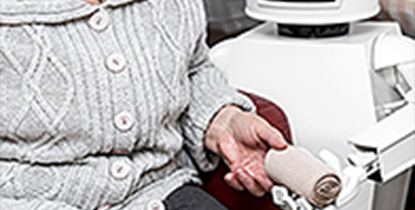
June 9, 2020, by Hazel Sayers
Nottingham experts join drive to develop Trustworthy Autonomous Systems
A multidisciplinary team of researchers from the University of Nottingham will be part of a Trustworthy Autonomous Systems Hub that will spearhead work to ensure that autonomous systems such as driverless cars and robots are trustworthy by default and can ultimately benefit society and industry.
Autonomous systems are technologies that gain information about their environment, learn, adapt and make decisions, with little or no human control. They can include automated software and ‘smart’ devices as well as self-driving cars, drones and robots.
UK Research and Innovation (UKRI) has invested £33 million from the Strategic Priorities Fund to support the Trustworthy Autonomous Systems programme, which originated through the Engineering and Physical Sciences Research Council’s (EPSRC) Big Ideas initiative. EPSRC will manage the programme, with £12 million being allocated to support the Hub.
The Hub, led by the University of Southampton, partners with the University of Nottingham and King’s College London and will bring together the UK’s world-leading expertise in areas ranging from computing and robotics to social sciences and the humanities. Fully integrated technical, social sciences and humanities research will allow the huge potential industrial and societal benefits of autonomous systems to be unlocked.
The project will establish a collaborative platform for the UK to deliver world-leading best practices for the design, regulation and operation of autonomous systems that are socially beneficial. The Hub will build a community that is coherent, connected and best placed to deliver fundamental research needed to make autonomous systems trustworthy in principle, and trusted in practice by individuals, society and government.
The Nottingham team includes researchers from across Computing, Engineering, Law, Medicine, Psychology, and Sociology. Professor Steve Benford, Dunford Professor of Computer Science and Director of the Smart Products Beacon said “The new hub provides a valuable opportunity to connect our vision of trusted smart products to the wider research community that is tackling the development of future autonomous systems”
Professor Sarvapali Ramchurn from the University of Southampton is leading the Hub and said: “Whether it’s a self-driving car doing the school runs or a virus tracing app alerting us to potential infections, autonomous systems of all types will increasingly test our trust in their design, regulation, and operation. We will need to work across disciplines and sectors, and take an inclusive approach, to ensure that autonomous systems are trustworthy by design and trusted by individuals and the wider society. Our international partnerships will also ensure that the programme will have a global impact and position the UK as a world leader in this area.”
Business Minister Nadhim Zahawi said: “Technologies like these have enormous potential to transform the way we work and travel. This new programme is therefore essential in increasing people’s confidence and ensuring innovations such as automated cars can become a key part of our everyday lives.”
The Hub will also provide a focal point for new market and society-led research as well as engaging a broad range of end-users, international collaborators and investors. It will explore methods of engagement and cooperation with the public, government, public and third sector organisations and industry to help define best practices, assurance processes, and formulate policy.
Over 60 Hub partners will contribute across a range of sectors and include AXA, BAE Systems, the BBC, Boeing, the Department for Culture, Media and Sport (DCMS), IBM, JP Morgan, Microsoft Research, QinetiQ, Shell, Siemens, Thales and Unilever, providing representation from Financial Services, Defence and Security, Technology, Healthcare, Autonomous Vehicles, Manufacturing, and Creative Industries.
The Trustworthy Autonomous Systems programme will also incorporate a further seven nodes, where each node will focus on a specific area of fundamental multidisciplinary research to address key challenges in the adoption of autonomous systems, such as trust, security and resilience. Funding for the nodes will be allocated later this year.
Dr Anna Angus-Smyth, Head of Artificial Intelligence and Robotics at EPSRC, said: “Autonomous systems are already in use in certain industries but there is more to be done to increase their trustworthiness. This will reduce barriers to their adoption by society and industry and the wider realisation of their possibilities. By convening expertise from across the UK’s research and innovation sector and conducting vital new research, the Trustworthy Autonomous Systems programme aims to break down these barriers and unlock this enormous potential by ensuring these systems are safe, reliable, resilient and operate in line with human values.”
No comments yet, fill out a comment to be the first

Leave a Reply